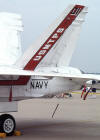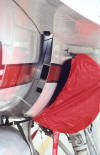|
Before I was married, I traveled far and wide to attend air shows. In
June of 1989, I was at the NAS Pax River air show. This was the first time I
was seeing one of the bright white and orange two-seat F-18s of the US Navy
Test Pilot School (USNTPS). I knew that one day I would like to build a
model of this aircraft, so I took a bunch of pictures of it.
USNTPS gets mostly low-block airframes that are too different from the
rest of the Hornet fleet to be suitable as standard unit aircraft, similar
to the aircraft that get assigned to the Blue Angels. The machine I saw on
this ocasion was no exception to the rule, being only the fourth two-seat
F-18 to get built. It was BuNo 161249, one of the final aircraft delivered
in the original production development blocks.
Considering the lineage of the airframe, a keen F-18 guru will notice
various anomalies on the airframe that are not part of the production
standard.
Click the thumbnails below
to view larger images:
 |
01 -
Front Right Overview
|
|
 |
02 -
Right Nose Area
While overall white, the aircraft is not pristine clean. Note the
visible panel lines in this image and in many of the other images. |
|
 |
03 -
Right Side Overview
|
|
 |
04 -
Right Rear Quarter
What is wrong with this picture? I am unsure if it is a detail of
early Hornets or what, but note that the flaps are up, and they
stayed up all day. I assume there is some form of control lock
available for the Hornet, I just do not ever remember seeing one in
use. For the record, I only noticed this while scanning my slides. I
did not notice when I was taking the pictures. |
|
 |
05 -
Right Tail Side
Note the alignment of the orange striping on the trailing edge of
the wings and the vertical tail. They meet together. |
|
 |
06 -
Left Rear Overview
|
|
 |
07 -
Left Tail Side
Note the touch-up above the BuNo for the aircraft designation. Not
too long before I took these pictures, the aircraft was a "TF-18",
and not a "F/A-18B". |
|
 |
08 -
Left Tail Side
I think the streamer hanging from the inboard flap hinge might
belong to a flap control lock, but I can not make out anything that
looks like a lock on the hinge, itself. |
|
 |
09 -
Test Pilot School Writing and Logo
Note the gray color of the blade antennae on the spine. |
|
 |
10 -
Mid-Fuselage Close-Up
|
|
 |
11 -
Left Nose Area
|
|
 |
12 -
Left Main Landing Gear
Note the edges of the landing gear doors are not red. Note the
intake warning stripes are red. Note the DANGER arrow for the intake
is black. |
|
 |
13 -
Centerline Fuel Tank
Note this is the original oval tank cross-section, not the round
cross-section tanks that became standard on the Hornet. |
|
 |
14 -
Intake Splitter Details
|
|
 |
15 -
Left Nose Area
|
|
 |
16 -
Nose Landing Gear
|
|
 |
17 -
Cockpit Area
Note the pilotís name is only present on the left side. |
|
 |
18 -
Left Nose Detail
Note the black RESCUE arrow. |
|
 |
19 -
Left Nose Cone
The tip seems darker than Radome Tan (F.S.33613). If I had to guess,
I would say it was closer to L.Gull Gray (F.S.36440). |
|
Home |
What's New |
Features |
Gallery |
Reviews |
Reference |
Forum |
Search